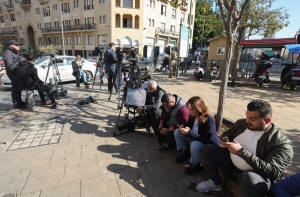Lebanese opposition lawmakers stage sit-in to demand new president
 Send a link to a friend
Send a link to a friend
 [January 20, 2023]
BEIRUT (Reuters) - Independent lawmakers in Lebanon are
staging a sit-in at parliament to pile pressure on dominant factions to
elect a new president nearly three months since the post fell vacant
with the country in the throes of an economic crisis. [January 20, 2023]
BEIRUT (Reuters) - Independent lawmakers in Lebanon are
staging a sit-in at parliament to pile pressure on dominant factions to
elect a new president nearly three months since the post fell vacant
with the country in the throes of an economic crisis.
"We're staying in an open session until further notice," lawmaker Najat
Saliba told Reuters by telephone on Friday, a day after the sit-in
began.
She is one of 13 independents elected last year in an election that
otherwise left the 128-seat parliament in the grip of long-dominant
sectarian factions that will ultimately determine the fate of the
presidency.
In a video filmed in darkness on Thursday evening, she said, "We are
here to implement the constitution ... remaining in the parliament until
we elect a president."
Lebanon has had neither a president nor a fully empowered cabinet since
Michel Aoun's term ended in October, further complicating the path out
of a financial meltdown left to fester by the ruling elite since 2019.

The currency collapsed on Thursday to a new record low of 50,000
Lebanese pounds to the dollar, marking a devaluation of more than 95%
since 2019 that has impoverished the nation.
Lebanon's divisive politics has resulted in the presidency - reserved
for a Maronite Christian - being left vacant numerous times.
The thresholds needed to secure a quorum and victory in the
parliamentary vote mean no single faction or alliance has enough seats
to impose their choice.
[to top of second column]
|

Journalists sit together near the
parliament building, where independent Lebanese lawmakers are
staging a sit-in protest to pile pressure on the dominant factions
to elect a new president, in Beirut, Lebanon January 20, 2023.
REUTERS/Aziz Taher

Aoun became head of state in 2016 with the support of his powerful
Shi'ite ally Hezbollah in a deal that also brought Sunni Muslim
politician Saad al-Hariri back as prime minister.
International rivalries, which have long played out in Lebanon's
domestic crises, have often complicated the process.
Hezbollah and its allies have close ties to Shi'ite-led Iran and
Syria, while their opponents in the Christian and Sunni communities
look to the West and Sunni-led Gulf Arab states.
The heavily armed Hezbollah, Lebanon's most powerful group, has said
the new president should be someone with broad support.
Anti-Hezbollah lawmaker Michel Mouawad has won the most votes in 11
unsuccessful presidential election sessions so far, but not enough
to win.
The World Bank has accused the ruling elite of orchestrating the
depression due to its exploitative grip on resources. The government
has failed to carry out reforms needed to secure an IMF deal and
unlock international support.
(Reporting by Timour Azhari and Tom Perry; Writing by Tom Perry;
Editing by Clarence Fernandez)
[© 2023 Thomson Reuters. All rights
reserved.]This material may not be published,
broadcast, rewritten or redistributed.
Thompson Reuters is solely responsible for this content.
 |